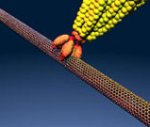Recently we’ve covered new battery technology and energy storage alternatives such as the cavern battery, the beltway battery and even batteries that recharge themselves. Enter the latest contender in energy storage – the virus battery.
MIT researchers have recently demonstrated the ability to genetically engineer viruses to construct the positively and negatively charged ends of a lithium-ion battery. The new batteries could be manufactured with an economical and more environmentally friendly process as the synthesis takes place at and below room temperature and requires no harmful chemicals, and the materials that make up the battery are non-toxic.
In a standard lithium-ion battery, lithium ions flow between a negatively charged anode usually composed of graphite and the positively charged cathode, typically cobalt oxide or lithium iron phosphate. The MIT team has engineered viruses that could build an anode by coating themselves with cobalt oxide and gold and self-assembling to form a nanowire. The viruses are a common bacteriophage that infect bacteria but are harmless to humans.
In laboratory testing the virus batteries could be charged and discharged at least 100 times without losing any capacity. This is expected to be improved greatly, ultimately allowing deep cycle battery applications for off grid solar and wind power energy storage.
Now that the team have demonstrated their virus battery prototype, the next step is to develop superior virus batteries using materials with higher voltage and capacitance, such as manganese phosphate and nickel phosphate. According to Angela Belcher, the MIT materials scientist who led the research team, once that hurdle is cleared the technology could be ready for prime time – commercial production.












































